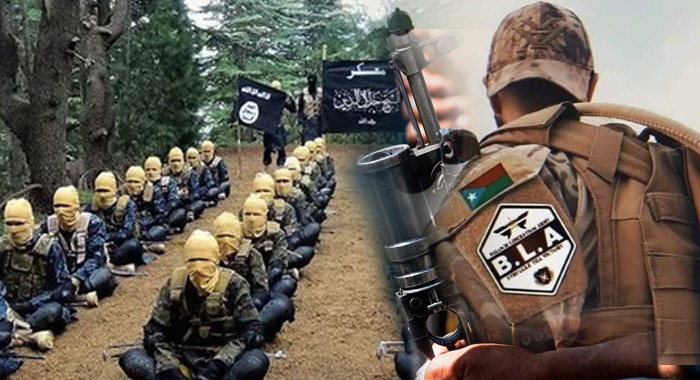The security dynamics in Balochistan are undergoing a drastic transformation following a recent and alarming development Islamic State Khorasan Province (ISKP), historically focused on sectarian and anti-state violence, has now openly declared war on Baloch nationalist insurgents, marking an unexpected shift in the province’s already volatile conflict landscape.
In an unprecedented ideological pivot, ISKP has denounced ethnonationalist agendas as “un-Islamic,” targeting both the Pakistani state and militant elements within its own operational zones. The declaration was formalized through a recently released booklet, which condemned ethnic nationalist movements in Pakistan, singling out the Baloch Yakjehti Committee (BYC) and its leader Mahrang Baloch, as well as the Pashtun Tahafuz Movement (PTM) and its head Manzoor Pashteen.
The situation escalated further when ISKP followed up with an audio statement accusing the Baloch Liberation Army (BLA) of killing its fighters in Mastung, prompting a formal declaration of war against the BLA. While ISKP has maintained a presence in Balochistan since its early formation, this is the first time it has directly challenged nationalist insurgents.
The implications of this new posture are significant. Since 2016, ISKP has claimed responsibility for 33 attacks across Balochistan, resulting in 436 deaths and over 690 injuries. Its primary targets have included Sufi shrines, churches, and political figures particularly those associated with the Jamiat Ulema-e-Islam (JUI). Among the politicians attacked by ISKP are senior JUI leaders such as Maulana Abdul Ghafoor Haideri, Hafiz Hamdullah, and Maulana Abdul Wasey. The group also attempted to assassinate former President Arif Alvi and was responsible for the 2018 killing of BAP leader Siraj Raisani during an election rally.
In addition to targeting political and religious figures, ISKP has also expanded its campaign to include Chinese nationals, exemplified by the abduction incident in Mastung. Security sources suggest that ISKP training camps exist near the Sindh-Balochistan border, where youth from local Brahui-speaking tribes are recruited for operations in Sindh.
Geographically, ISKP’s operations in Balochistan are primarily concentrated in central-western districts including Mastung, Quetta’s outskirts, Kalat, Bolan, and Khuzdar areas predominantly populated by Baloch communities with strong religious affiliations. In Mastung alone, the group has carried out at least 12 attacks; Quetta has seen 10. These regions also serve as centers of support for the JUI, a party that enjoys deep-rooted influence dating back to the religious patronage policies of the pre-independence princely state of Kalat.
The ideological battleground in Balochistan is also shifting. Over the past 15 years, Shia institutions have expanded their presence in the region, often clashing ideologically and at times violently with groups like Lashkar-e-Jhangvi, which has since merged with ISKP. Sectarian attacks, particularly on Shia pilgrims traveling through Mastung and Nushki, have been frequent.
Meanwhile, groups like Tehreek-e-Labbaik Pakistan (TLP) have gained a foothold along the Quetta-Karachi corridor, backed by supporters originally from Balochistan who now reside in Karachi. Despite this ideological diversity, JUI remains the dominant political force in much of the region.
ISKP’s repeated targeting of JUI figures in both Balochistan and Khyber Pakhtunkhwa appears to stem from its view of the party as a local proxy for the Afghan Taliban ISKP’s ideological nemesis. The rift between the Taliban and ISKP centers on their conflicting visions of governance: the Taliban seeks a nationalist Islamic emirate, while ISKP advocates for a global caliphate, dismissing nationalism as a Western ploy.
Now, with ISKP’s animosity extending beyond religious sects and state institutions to include secular nationalist movements like the BLA and PTM, a new and dangerous front appears to be opening. This could lead to heightened risks for civil rights groups and peaceful activists while increasing the likelihood of violent confrontations between jihadist and nationalist factions in contested regions.
So far, both BLA and ISKP have operated in parallel without direct confrontation despite overlapping operational territories. But the status quo may be shifting. While BLA’s reach spans vast parts of Balochistan, ISKP remains localized in areas like Mastung. Even so, its rising presence threatens to complicate the insurgent landscape and provoke internal rivalries that could destabilize the region further.
Whether this new conflict will serve the interests of Pakistan’s security apparatus remains uncertain. On one hand, rival militant groups might weaken each other. On the other, ISKP’s adaptability and radical ideology could result in an even more fragmented and unpredictable security environment.
Rather than abandoning its long-standing strategy, ISKP appears to be recalibrating positioning itself as an uncompromising ideological force ready to confront all actors it views as threats, including other insurgent groups. As Balochistan contends with a mosaic of overlapping militant and political tensions, ISKP’s latest moves may push the province into an even deeper quagmire.





